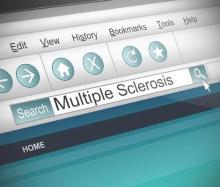For patients who have active multiple sclerosis despite using injectable immunomodulators, switching to the oral immunomodulator fingolimod yields fewer relapses and less disability than did switching to a different injectable immunomodulator, according to a report published online Feb. 9 in JAMA Neurology.
To compare MS outcomes using different treatment regimens, researchers used information from the MSBase registry, which collects observational data on the disorder as part of routine patient care. For this study, the investigators retrospectively analyzed data entered during 1996-2014 for 527 patients who had breakthrough disease while receiving injectable immunomodulators (typically an interferon beta/glatiramer acetate preparation) and who switched to either oral fingolimod (148 patients) or a different interferon beta/glatiramer agent (379 patients).
The two groups were propensity matched for baseline clinical and demographic variables, including patient age, area of residence, MS duration, total number of previous treatments, disability score, number of relapses, and previous medications. They were followed for a median of 13 months (range, 3-80 months) after switching therapies, said Dr. Anna He of the department of neurology, Royal Melbourne Hospital, and her associates.
Patients who switched to fingolimod showed a decreased risk of relapse, compared with patients who switched to a different injectable, with a hazard ratio of 0.74. They also showed a 47% decreased risk of progression of disability (HR, 0.53). And the fingolimod group showed a markedly increased likelihood of disability regression (HR, 2.0). In addition, the rate of continuing on the new treatment at 2 years was higher with fingolimod (82.5%) than with a different injectable (73.2%), Dr. He and her associates said (JAMA Neurol. 2015 Feb. 9 [doi:10.1001/jamaneurol.2014.4147]).
“Although analyses of observational data do not serve as a substitute for trial data, our study provides real-world evidence, representative of clinical practice in tertiary MS centers, to support clinical decision-making that is highly relevant to the management of active MS,” the investigators said.
This study was supported by Novartis, the maker of fingolimod; Multiple Sclerosis Research Australia; the Australian National Health and Medical Research Council; the Centre for Research Excellence; and the MSBase Foundation, a not-for-profit group that receives support from Bayer Schering, Biogen Idec, Merck Serono, Novartis, and Sanofi. Dr. He reported having no financial disclosures; her associates reported ties to numerous industry sources.


